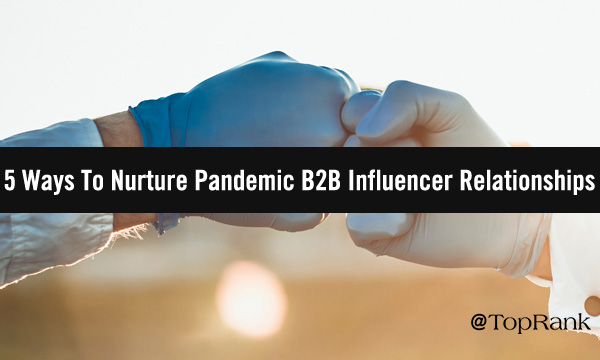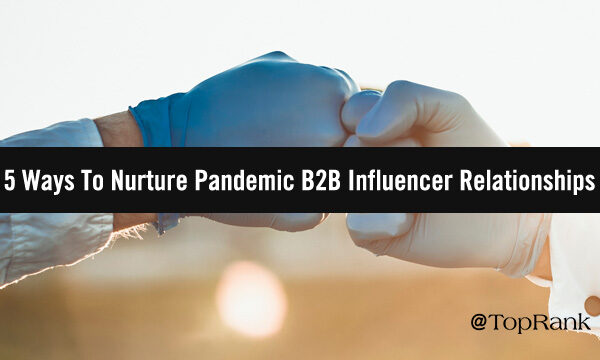
I’m so glad that I went to B2BMX this past February.
For one thing, we did some amazing interviews with some very smart marketers. The very idea of these interviews seems weird now — we were just sitting! Three feet apart! With no masks! At a giant marketing conference at a hotel!
The cancellation of in-person events means I’ll miss one or two conferences this year. But for folks who make a living as keynote speakers and thought leaders, it’s a massive adjustment. And that includes a sizable subset of B2B influencers — those who are primarily keynote speakers and in-person consultants.
As an agency, we’re true believers in B2B influencer marketing (see our latest report to learn why). But we have had to adjust our strategy as influencers’ needs change. Like everything else in 2020, influencer relationship-building takes a different approach than you might be used to.
Debbie Friez is an Influencer Marketing Strategist at TopRank Marketing, and she’s an expert at finding the right influencers and developing ongoing relationships. Here’s what Debbie and I have observed and how we’ve changed our outreach strategy.
How to Nurture B2B Influencer Relationships During the Pandemic
Influence relationships operate by much the same rules as any friendship: Get to know the person, don’t talk about yourself too much, give something before you ask for anything, and be sensitive to their emotions and needs. And, of course, don’t propose marriage on the first date (unless it’s going REALLY well).
On top of those rules, here are a few ways to adjust your approach for the current crisis.
“Influence relationships operate by much the same rules as any friendship: Get to know the person, don’t talk about yourself too much, give something before you ask for anything, and be sensitive to their emotions and needs.” @NiteWrites Share on X#1: Scale Back Your Requests
It’s easy to imagine that influencers have nothing but free time right now. After all, they’re not traveling as much, and all the events are virtual — that means they should have ample time to write a blog post or film a webinar, right?
What we’ve seen, however, is the opposite is true. Those who make a living at public speaking are hustling harder than ever. “Now that all the events are virtual, there is a disconnect between how influencers are compensated,” says Debbie. Instead of a 90-minute in-person talk, influencers might need to do a dozen webinars to make ends meet.
Now is a good time to focus on micro-content — keep the requests down to 50-100 words. Where you might have asked one influencer for a 500-word blog, ask three influencers the same question and do a roundup of their answers. Or focus on social-first content that can be bite-sized but still foster engagement.
Simply put, it’s more important than ever to respect influencers’ time and make sure your requests are appropriate. Speaking of which…
“It’s more important than ever to respect influencers’ time and make sure your requests are appropriate.” @NiteWrites Share on X#2: Offer a Good Value Exchange
Every good influencer relationship is based on a value exchange. You’re giving the influencer something they want, and getting something you want in return. When you build relationships for long-term, always-on influencer marketing, that value exchange tends to be in terms of co-creating awesome content together, exposure to each others’ audience, and other non-monetary benefits. However, direct compensation is always part of the influencer marketing toolkit.
Right now, influencers may see less value in co-creation and be looking for more ways to supplement their income. “Frequently, influencers would co-create content for free, as they were taking payment to speak at or attend events,” Debbie says. With events on pause, it’s important for influencer marketers to budget for the right type of compensation.
#3: Be Empathetic
As you might have noticed, it’s rough out in the world right now. Odds are you’re stressed out, concerned about keeping your family safe and the bills paid. You may even have scaled back on your social media and focused more energy inward.
Influencers are no different. It’s important that your outreach be warm (no blind InMail requests or impersonal emails), sympathetic, and respectful. Just as you’ve adjusted your content marketing to meet your audience’s current mental state, make sure your influencer outreach is appropriate for the times.
#4: Offer Creative Opportunities
Odds are any influencer you reach out to has done multiple webinars, guest blogs, and livestreams in the past six months. And they’re likely filling their calendars with as many more gigs as they can get. What can you offer an influencer that will get their attention?
Now is a good time to pitch fun, creative ideas for content. How about a brief interview that you’ll turn into a fully-produced podcast, complete with background music and sound design? Or a short contribution that will be featured in a dynamic, interactive asset? The easier you can make the ask, and the cooler you can make the end product, the better.
#5: Explore Always-On Influence
As you’ve seen, it can be challenging to establish relationships with influencers right now. People are busy, distracted and stressed, and it’s easy for your messages to get lost in the shuffle. It’s not impossible, of course, to add net new influencers to your marketing — it just takes more effort.
Right now, brands that have ongoing influencer nurturing programs are doing better than those without. It’s easy to see why — they’re not starting from scratch. They have built up a community of influencers over time, co-creating content, helping each other out, even introducing influencers to each other to help them network. It’s easier to maintain an ongoing relationship than start a brand new one.
“Right now, brands that have ongoing influencer nurturing programs are doing better than those without. It’s easy to see why — they’re not starting from scratch.” @NiteWrites Share on XRelationships Are Worth the Work
We surveyed hundreds of marketers for our 2020 State of B2B Influencer Marketing report. The vast majority said that influencer marketing works for B2B: 74% agree that influencer marketing improves customer and prospect experience with the brand, and 90% plan to increase their budget in the near future.
While the current business climate may make it more challenging to develop influencer relationships, the results are well worth the effort.
Need help with B2B influencer marketing? It’s our specialty.



